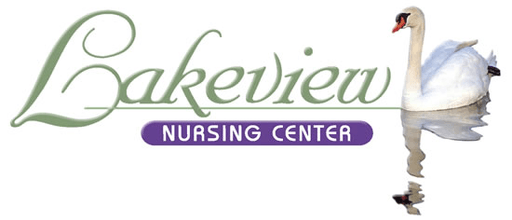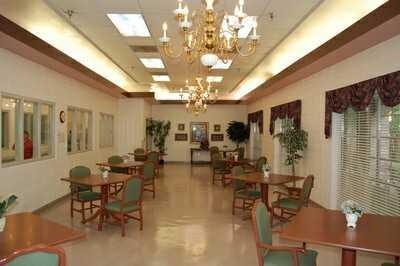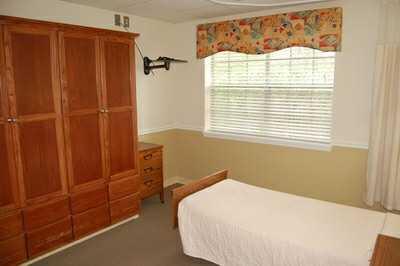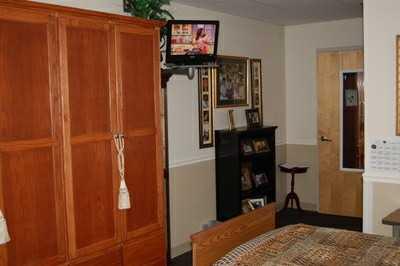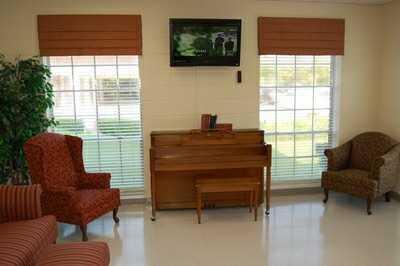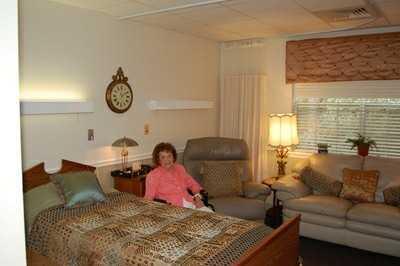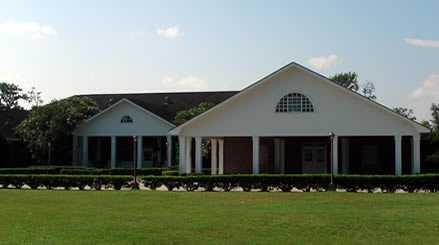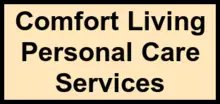Lakeview Nursing Center is a magnificent assisted living community in Gulfport, Mississippi. It is within astounding Harrison County which is part of the Magnolia State.
Lakeview is nestled on a gentle lawn where peacocks and swans roam the grounds before a placid lake which is in full view from our beautiful veranda. This comfortable, homelike facility completed in 1994, features a 26-bed Rehab Unit that offers short or long-term rehabilitative stays. In addition to our Rehab Unit, Lakeview has 79 long-term care beds with 10 personal care beds. Private and semi-private rooms are tastefully decorated. Lakeview Nursing Center is more than a place to stay. In fact, it’s home to some of the nicest people on the Coast. Our staff and facility offer our residents and rehab patients the security, comfort and care of home. At Lakeview, we are committed to giving the best care possible, in addition to providing a variety of specialty and rehabilitative programs.
Our Services Include:
- Modern 105 Bed Facility
- 24 Hour Nursing Coverage
- Occupational, Physical, and Speech Therapy
- Transportation for Resident Appointments
- IV Therapy
- Dialysis Care
- Long Term/Short Term Care
- Classified as a Hurricane Shelter
- Daily Activities to Promote Socialization and Stimulation
- Wound Care
- Therapeutic Diets
- Full Range of Religious Services
- Personal Laundry Services
- Salon Services
Physical Therapy is a service that enables individuals to maintain and restore movement and functional abilities that have been lost due to illness, injury, or the aging process. It also is provided for the prevention of disability. Physical therapists treat patients of all ages with various different conditions. These conditions include:
- Pain/ Spasms
- Stroke
- Heart and lung conditions
- Pneumonia
- Congenital abnormalities
- CHF
- Joint conditions (including replacements)
- As well as generalized weakness caused by a debilitating illness or disease
- Fractures
- Soft Tissue Injuries
- Sprains/Strains
Our Physical Therapy Staff provides treatments in a relaxed environment with utmost consideration for patient and family goals. Our experienced staff utilizes a variety of techniques for treating and assessing body malfunctions. After a patient is evaluated, an individual treatment plan is established, including setting up long and short term goals. The following modalities are used to help restore mobility and allow the individual to regain the highest possible level of function.
Occupational therapy is a common rehabilitation healthcare service, but what does it really mean? The word “occupation” in occupational therapy means “the jobs of everyday living”, such as:
- Cooking a meal
- Getting dressed
- Taking a bath
- Brushing one’s hair or teeth
- Community activities
- Vocational activities
Occupational therapists work with individuals who have conditions that are mentally, physically, developmentally, or emotionally disabling. They help them to develop, recover, improve or maintain daily living and work skills.
A Speech- Language Pathologist (SLP) evaluates and treats disorders of speech, language, voice, and swallowing. As part of an interdisciplinary treatment program, the speech language pathologist educates and counsels people on the impact of and strategies for communication disorders.
SLPs assess speech production (articulation), oral motor abilities, comprehension, verbal expression, reading, writing, general executive functions (memory, attention cognitive communication) and accent modification.
Patients with Alzheimer’s dementia and their families may benefit from Speech Language Therapy to address compensatory strategies to maximize and mantain communication for as long as possible. The SLP can determine the specific stage of dementia and develop a home program to maintain optimal cognitive linguistic functioning.
SLPs are trained in identification and treatment of swallowing disorders (Dysphagia). A swallow evaluation looks at a person’s ability to safely swallow food and liquid to maintain nutrition and hydration. Treatment may consist of training in compensatory strategies, determining best diet texture for sefety, DPNS, Vital Stim or oral motor exercises. The ultimate goal of any intervention is to preserve the person’s quality of life for as long as possible.
There are many causes of speech and language disorders or swallowing disorders such as:
- Aphasia
- Apraxia
- Dementia
- Dysarthria
- Head and Neck cancer
- Parkinson’s Disease
- ALS
- Huntington’s Disease
- Stroke
- Traumatic Brain Injury
- Anoxia
- Cerebal Palsy
- Bell’s Palsy
- Hearing Loss resulting in articulation deficits in childern
- Cogenital or Developmental Disorders
- Memory Loss
- ADD in Adults and Children

